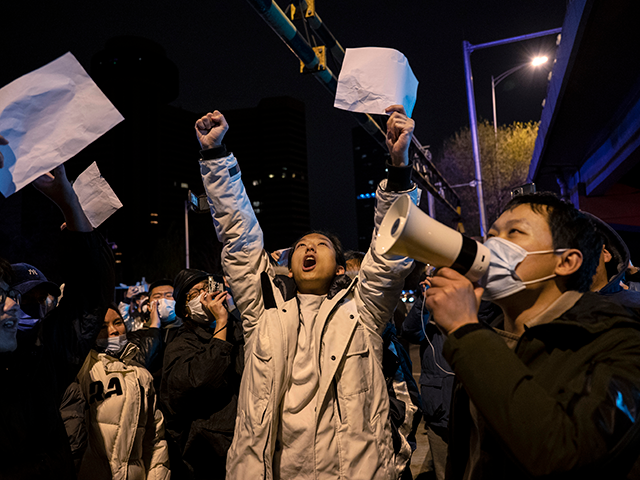The end of November brings the one-year anniversary of China’s remarkable “White Paper” protests, a massive popular uprising against dictator Xi Jinping’s destructive coronavirus lockdowns.
The demonstrations became the largest in China since the Tiananmen Square uprising of 1989, and with a happier ending, although analysts both inside and outside of China are still pondering what it all really meant.
The event that kicked off the White Paper protests occurred on November 24, 2022, in Urumqi — the capital of what China refers to as Xinjiang province. The oppressed Uyghur Muslims of East Turkistan held a vigil outside the Chinese Embassy in London to commemorate the apartment fire that unleashed a wave of national outrage, as Xi’s coronavirus lockdowns trapped residents inside the burning building and prevented firefighters from reaching the scene:
Yesterday's vigil outside the Chinese Embassy, London, commemorating the victims of the Urumchi fire which started in an apartment block on 24 November 2022. We also demanded an end to genocidal persecution by the CCP state, and freedom for the Uyghurs.https://t.co/V91nsXwhiv pic.twitter.com/wKqMmBUCBz
— Uyghur Solidarity Campaign UK (@CampaignUyghur) November 25, 2023
Xi’s regime clearly underestimated how fast and far outrage over the Urumqi apartment fire would spread. Two years of pent-up frustration over coronavirus lockdowns exploded in city after city, including Beijing, where an astoundingly courageous dissident who came to be known as “Bridge Man” displayed huge banners calling for Xi’s ouster:
A banner against Xi Jinping is raised at Sitong Bridge, Haidian District, Beijing.
Admire the courage of this man, but when the giant ship sank, the screams of the passengers were only the meaning of tragedy.#TheGreatTranslationMovement pic.twitter.com/tMt4spulZR— The Great Translation Movement 大翻译运动官方推号 (@TGTM_Official) October 13, 2022
“Food, not Covid tests. Freedom, not lockdowns. Reforms, not the Cultural Revolution. Elections, not leaders. Dignity, not lies. Citizens, not slaves,” one of the banners read.
Bridge Man — a retired teacher named Peng Lifa — was swiftly arrested and thrown into one of China’s many secretive dungeons, along with some other prominent protesters. Knowing that a crackdown was inevitable, the November 2022 uprising borrowed a literal page from Hong Kong pro-democracy protesters and used blank sheets of paper as their symbol. The tactic was meant as a sarcastic taunt to the Chinese police state, essentially daring the authorities to arrest dissidents for saying nothing at all.
Xi’s police state rose to that challenge, and people were indeed arrested for waving blank sheets of paper, but eventually, the dictatorship relented and called off its coronavirus lockdowns just a few months after signaling that lockdowns could be a semi-permanent feature of Chinese life. For the first time since the Communist takeover, the people appeared to have won a contest of wills against their government.
One year later, the legacy of the White Paper protests is mixed. Xi made a point of punishing his subjects by immediately abandoning almost all containment measures, resulting in a massive surge of coronavirus deaths, which the regime tried to conceal.
The regime placed a high priority on separating White Paper protesters from supporters abroad, portraying the demonstrations as a seditious plot hatched by foreigners. China ramped up “long-arm” law enforcement tactics against activists and students living overseas, keeping them under control by threatening their families. Some demonstrators inside China were brutalized by the police and kept under surveillance for months after the protests ended.

Protesters shout slogans during a protest against China’s strict zero-COVID measures on November 28, 2022, in Beijing, China. (Kevin Frayer/Getty Images)
The White Paper movement did not develop into an enduring nationwide crusade for more rights and greater political freedom. The astounding number of people who joined the protests at their peak seemed satisfied when coronavirus lockdowns ended for good.
Kept under constant surveillance and bullied by the online hyper-nationalists known as “Little Pinks,” most Chinese are shy about participating in dissident political activism. It took a crisis as massive as the lockdowns, and an event as shocking as the Urumqi fire, to bring huge numbers of them into the streets.
“Everyone seems to have gone back to daily life … and we’re the only activists left. We’re still on the beach, yet the waves seem to have receded. It feels as if we’ve been left high and dry,” a Chinese student living in Germany told Radio Free Asia (RFA) on Sunday.
The Economist noted that China’s leadership never officially surrendered to the White Paper movement or acknowledged that massive demonstrations brought about the end of the lockdowns, so individual protesters must argue for the success of their movement. Xi and his cadres remain firmly in power, so the “official verdict” of history remains elusive.
COMMENTS
Please let us know if you're having issues with commenting.